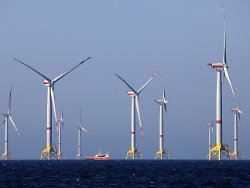Friday 5th November 2021
Without government funding
Iberdrola is planning a new wind farm in the Baltic Sea
In the Baltic Sea, Iderdrola wants to have its “Baltic Hub” installed by 2026 with a line of more than one gigawatt. The next stage of expansion begins with the “Windanker” wind farm. The company makes demands on the future federal government.
The energy company Iberdrola is planning what it claims to be the first offshore wind farm in the German Baltic Sea without state funding. The project, called “Windanker”, should go online in 2026 with a capacity of 300 megawatts, as the company announced. The investments are estimated at 800 million euros. Instead of being fed in at a predetermined market premium, large parts of the service are to be marketed through long-term contracts with customers. According to the Offshore Wind Energy Foundation, so far only two wind farms are planned in the North Sea without funding.
Iberdrola Germany boss Iris Stempfle said that the Baltic Sea is sometimes technically more demanding than the North Sea when it comes to the construction of offshore wind farms. However, the company benefits from technical progress, for example in the form of more efficient turbines. In addition, it can use existing experience and synergies on site.
“Windanker” is to expand Iberdrola’s “Baltic Hub” – consisting of the wind farms “Wikinger” and “Baltic Eagle” – a group of then three wind farms off the island of Rügen. One of them is already in operation and another is under construction. After a total investment of 3.5 billion euros, the “Baltic Hub” should have a capacity of 1.1 gigawatts by 2026.
Hope for more dynamism in offshore wind energy
According to the Offshore Wind Energy Foundation, there are currently 27 wind farms with a total output of 7.76 gigawatts on the grid in the German North and Baltic Seas. The statutory expansion targets are 20 gigawatts by 2030 and 40 gigawatts by 2040. Critics consider this to be too low.
According to his own statement, Stempfle hopes for more dynamism in the expansion of offshore wind energy in Germany. “We have great hopes for the new federal government.” This involves, for example, the allocation of areas and species protection. “We have to do what we can to ensure the protection of native species and at the same time think more ambitiously as a society if we want to achieve the energy transition.”
In addition, she wished the rulers “not to change the rules of the game during the game” and recalled the federal government’s reduction of the expansion targets in the meantime. These were reduced in 2014 due to the initially high need for subsidies and the corresponding increases in the price of electricity. As a result, there was an interruption in expansion, known in the industry as a “thread break”.
